★★★★
“Nikita meets Alias, while on vacation in South Korea”

 Let’s be clear, right out of the gate. There is really not much original about this Korean mini-series, which takes huge chunks, almost wholesale from Nikita and Alias, to the extent, for example, that we perpetually referred to one character as “Amanda”, since she reminded us so much of Melinda Clarke’s character from Nikita, right down to her fashion choices. However, as long as you’re not looking for anything startling in the way of originality, this is slick yet gritty, with characters that are interesting to spend time with, and a handle on the action that’s easily the match for its equivalent in the West. Let’s start with some significant plot exposition, because there’s quite a lot of characters and story crammed into the three one-hour (or slightly more) episodes.
Let’s be clear, right out of the gate. There is really not much original about this Korean mini-series, which takes huge chunks, almost wholesale from Nikita and Alias, to the extent, for example, that we perpetually referred to one character as “Amanda”, since she reminded us so much of Melinda Clarke’s character from Nikita, right down to her fashion choices. However, as long as you’re not looking for anything startling in the way of originality, this is slick yet gritty, with characters that are interesting to spend time with, and a handle on the action that’s easily the match for its equivalent in the West. Let’s start with some significant plot exposition, because there’s quite a lot of characters and story crammed into the three one-hour (or slightly more) episodes.
Spoilers Episode 1. Cha Yeon-Jim (Groo) is having a bad day – she just got expelled from school – and it’s about to get an awful lot worse. Hanging out by the docks, she and her friends get into a confrontation with some workers, only for things to be interrupted by a scripture-quoting hitman, Jang Se Wook, who shows up and starts shooting everyone, on both sides. Cha escapes, but when her friend is killed, as he tries to report what he saw to the police, she realizes she’s in deep trouble. Policeman Choi Tae Young (Baek), who was also at the scene, tries to track her down, but Jang is also after Cha. He wants her to return a flask of green liquid she took in the confusion, and kidnaps her mother to force Cha into compliance. At the handover, Mom is impaled by Jang’s sword and Cha is gunned down and left for dead.
Episode 2. Chief Min Ji Young (Park) comes on the scene, and saves Cha, faking her death. Min works for the same company as Jang, the Mirae Corp, a medical company run by Kwon Do Hwan. They are engaged in some shady experiments involving stem-cell research, and in particular the creation of artificial humans for organ harvesting, with the protection of high-up government ministers. To protect their company secrets, their division SS1 operates ruthlessly: Min recruits Cha as a new killer, not telling her Jang is simply another arm, but training her as an assassin, with the lure of eventually tracking down and taking revenge on the man who killed her mother. Cha’s initial targets are those who pose a threat to her employers, but Min has her own agenda, and when Jang has eventually proven to have outlived his usefulness, she has no compunction about turning her two killers on each other.
Episode 3. Choi accidentally bumped into Cha in part two, under her new identity, and now teams up with Yoo Sung Ho (Kim), who used to be part of SS1, but bailed with his lover, Cha’s mother, and went into hiding – he was replaced by Chief Min. They are seeking evidence that will let them bring down Mirae and expose their human experiments. Cha wants to leave the organization, having fallen for Go Young Min, a boy at school. Min initially requests “one last hit” – so you know that’s going to work out just fine… In the process, Go sees Cha standing over the corpse of her target, holding the murder weapon, and as a result has to be terminated by Chief Min. That, and the discovery that her schoolmates have been used as guinea-pigs turns Cha against Mirae, and she links up with Choi, as Kwon prepares to reveal his latest plan. End spoilers
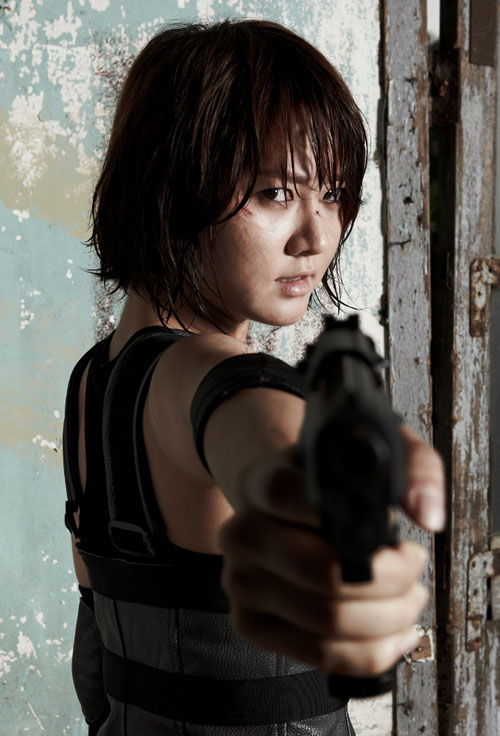 Phew. Plenty going on there, with enough for a full 13- or 22-episode order of most series, between all the twists, turns and revelations e.g. turns out Cha’s relationship to Chairman Kwon is rather more personal than she is aware. Given how much gets crammed in, the opening installment is a bit of a slow start. The entire first episode is more or given over to setting up the scenario, with Cha showing very little of the skills she has developed later on. She’s semi-competent in basic martial arts, which is perfectly fine when it comes to beating up fellow pupils. But we soon find out that this level of skill is far from enough, when she comes up against Jang and the other professional killers of SS1. Early on, it’s Choi who is most entertaining, portraying a dutiful and dogged cop whose superiors refuse to give him more than a gas pistol which is, similarly, pretty useless in the clutch.
Phew. Plenty going on there, with enough for a full 13- or 22-episode order of most series, between all the twists, turns and revelations e.g. turns out Cha’s relationship to Chairman Kwon is rather more personal than she is aware. Given how much gets crammed in, the opening installment is a bit of a slow start. The entire first episode is more or given over to setting up the scenario, with Cha showing very little of the skills she has developed later on. She’s semi-competent in basic martial arts, which is perfectly fine when it comes to beating up fellow pupils. But we soon find out that this level of skill is far from enough, when she comes up against Jang and the other professional killers of SS1. Early on, it’s Choi who is most entertaining, portraying a dutiful and dogged cop whose superiors refuse to give him more than a gas pistol which is, similarly, pretty useless in the clutch.
It’s the second part where things really take off, as events jump two years forward; the show takes Cha’s training largely as read, save for a quick montage. Instead, her new cold-bloodedness is amply demonstrated in the opening sequence, where we see her sniping out her target at a wedding, despite the presence of children which makes Chief Min call off the hit. It’s clear that this is a new, focused girl, with skills to match. Of course, as is standard for the genre, she still has to deal with everyday issues, since she has been sent back to school [which, conveniently, also offers a suitable tower from which to carry out missions, as can be seen above]. From there, through to her final confrontation with Cha and his minions, it’s an excellent bit of TV, one of the most intense action-heroine episodes I’ve seen in any genre, with the heroine taking obvious damage, both mentally and physically, as things proceed.
Let’s pause for breath before we hit the finale. One thing we noted was that Korean rules regarding what can be broadcast on TV are apparently a good deal laxer than in the US. This was, apparently, a late-night series, and it’s not clear if this was “over the air” or cable; there’s apparently advert breaks, but that could still make it something like FX or AMC. [Edit: CGV channel is “a movie cable channel”, so SHOtime or HBO would be closer parallels] The violence is generally crunchy and squibby, but it’s the female nudity that’s an unexpected pleas… er, particularly striking. :) There does also appear to be some confusion over the title of the show, which I’ve seen called several different variations of the letter K, as noted above. Here, I’ve gone with what appears on the intro screen in English for each episode.
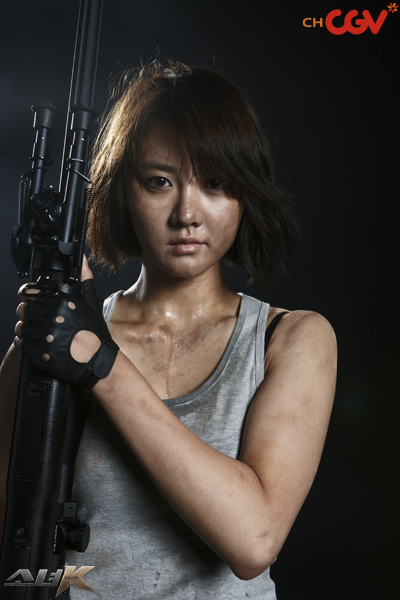 We were kinda wondering where things might go in the last episode, with Cha having apparently sorted things out. Never mind: a whole new catalog of problems raise their heads, as the removal of her justification for assassination leaves her seeking a return to the normal life, one Chief Min is none too keen to offer. With its emphasis on discovering the truth about SS1 and the organization behind it, this episode reminded me of Alias after Sidney Bristow discovered. Meanwhile, dealing with boy issues was a throwback to early Buffy. However, the human experimentation thread was a fresh ingredient, and the episode didn’t pull from the darkness, with a subplot involving a Mirae whistleblower and SS1’s efforts to hush it up. Even if Cha and Min suddenly can’t hit the side of a barn in their final confrontation, the threads are satisfactorily tied up down the stretch, with an ending pilfered shamelessly from My Wife is Gangster 2, that hopefully hints at more to come down the line.
We were kinda wondering where things might go in the last episode, with Cha having apparently sorted things out. Never mind: a whole new catalog of problems raise their heads, as the removal of her justification for assassination leaves her seeking a return to the normal life, one Chief Min is none too keen to offer. With its emphasis on discovering the truth about SS1 and the organization behind it, this episode reminded me of Alias after Sidney Bristow discovered. Meanwhile, dealing with boy issues was a throwback to early Buffy. However, the human experimentation thread was a fresh ingredient, and the episode didn’t pull from the darkness, with a subplot involving a Mirae whistleblower and SS1’s efforts to hush it up. Even if Cha and Min suddenly can’t hit the side of a barn in their final confrontation, the threads are satisfactorily tied up down the stretch, with an ending pilfered shamelessly from My Wife is Gangster 2, that hopefully hints at more to come down the line.
As noted, most of the content is material with which most genre aficionados will already be extremely familar, but there seems always to be room for another “faked death assassin” – Nikita alone has already led to three movies and a pair of television series. It’s the execution(s) that matter here, and this is easily the match of Western action heroine productions of late. I wouldn’t be surprised if this ends up heading over to the West in some form or other, most likely a remake, as has been the case for some many Korean, Japanese and HK movies in recent years. If so, they’ll have to do sterling work to match up with this original.
[Thanks to Hyomil for most of the pics. Killer K can be enjoyed in a subbed version online, through sites such as viki.com, albeit with a somewhat irritating sous-title commentary, which makes watching the show like sitting in the theater with a bunch of chatty teenagers. Still, better than nothing!]
Dir: Kim Jong Hyun
Star: Han Groo, Park Hyo Joo, Baek Do Bin, Kim Jung Tae
a.k.a. Girl K, Little Girl K, Killer Girl K





 Rika (Kudo) and her schoolgirl pal ditch education for a day and head off to a remote village to check up on her grandfather, who hasn’t been heard from for a while. But as soon as they arrive, the pair come under attack by zombies, initially spawned as the result of a euthanasia drug being tried out by the Japanese government to address the whole “inverse pyramid” thing. They do reach Grandpa’s house, but find him in the stages of advanced Alzheimer’s – at least, until Rika is bitten. Gramps removes the limb, and replaces it with one conveniently lying around, which happens to belong to a master zombie hunter. Who cares if it’s the wrong colour and incredibly muscular? With America preparing a Return of the Living Dead style cleansing operation on the area, Rika and her allies have to locate the King Zombie and kill him, before being reduced to their constituent atoms.
Rika (Kudo) and her schoolgirl pal ditch education for a day and head off to a remote village to check up on her grandfather, who hasn’t been heard from for a while. But as soon as they arrive, the pair come under attack by zombies, initially spawned as the result of a euthanasia drug being tried out by the Japanese government to address the whole “inverse pyramid” thing. They do reach Grandpa’s house, but find him in the stages of advanced Alzheimer’s – at least, until Rika is bitten. Gramps removes the limb, and replaces it with one conveniently lying around, which happens to belong to a master zombie hunter. Who cares if it’s the wrong colour and incredibly muscular? With America preparing a Return of the Living Dead style cleansing operation on the area, Rika and her allies have to locate the King Zombie and kill him, before being reduced to their constituent atoms. Eryn Cates (Hague) returns home to Texas from finishing school in New York, to find her family farm teetering on the edge of foreclosure [maybe if they hadn’t spent all that money to send her to finishing school in New York…]. In a misguided attempt to help things, her brother tries to rob a stagecoach carrying payroll, but is injured. The attempt fails, but local mogul Mortimer (Harris), who holds the loan on the Cates farm, sees a chance and pockets the loot. Two Texas Rangers, including the young and handsome Flint (Hagenbuch) show up to investigate the robbery, but it’s up to Eryn to save the family property, take on the mantle of the bandit, fend off the unwanted advances of Mortimer and engage in pseudo-romantic banter of the least interesting or convincing sort with Flint.
Eryn Cates (Hague) returns home to Texas from finishing school in New York, to find her family farm teetering on the edge of foreclosure [maybe if they hadn’t spent all that money to send her to finishing school in New York…]. In a misguided attempt to help things, her brother tries to rob a stagecoach carrying payroll, but is injured. The attempt fails, but local mogul Mortimer (Harris), who holds the loan on the Cates farm, sees a chance and pockets the loot. Two Texas Rangers, including the young and handsome Flint (Hagenbuch) show up to investigate the robbery, but it’s up to Eryn to save the family property, take on the mantle of the bandit, fend off the unwanted advances of Mortimer and engage in pseudo-romantic banter of the least interesting or convincing sort with Flint. Ok, it has become the biggest-grossing action heroine film
Ok, it has become the biggest-grossing action heroine film  Last month, we saw MMA star Gina Carano hit the big-screen in Haywire, but she’s not the first genuine female martial-artist to have started a movie career. Most obviously, Cynthia Rothtock was a five-time World Karate Champion in forms and weapons, and has a number of black belts in various disciplines. Similarly, Jeeja Yanin was a third-Dan black belt in Taekwondo, before hitting the silver screen in Chocolat. But here, we’ll be looking at the name that has recently emerged out of Japan, Rina Takeda, holder of a black belt in Ryukyu Shorin-ryu Karate.
Last month, we saw MMA star Gina Carano hit the big-screen in Haywire, but she’s not the first genuine female martial-artist to have started a movie career. Most obviously, Cynthia Rothtock was a five-time World Karate Champion in forms and weapons, and has a number of black belts in various disciplines. Similarly, Jeeja Yanin was a third-Dan black belt in Taekwondo, before hitting the silver screen in Chocolat. But here, we’ll be looking at the name that has recently emerged out of Japan, Rina Takeda, holder of a black belt in Ryukyu Shorin-ryu Karate. The entertainment value you get from this may depend on your expectations. It undoubtedly works best as a party-tape, show-casing the “no wires, CGI or stunt doubles” approach, but I have to beg to differ with some of the critical savaging it has received. Even
The entertainment value you get from this may depend on your expectations. It undoubtedly works best as a party-tape, show-casing the “no wires, CGI or stunt doubles” approach, but I have to beg to differ with some of the critical savaging it has received. Even  The film manages to cram just about every cliché of martial-arts films into its 92 minutes, with a plot driven by four major threads:
The film manages to cram just about every cliché of martial-arts films into its 92 minutes, with a plot driven by four major threads: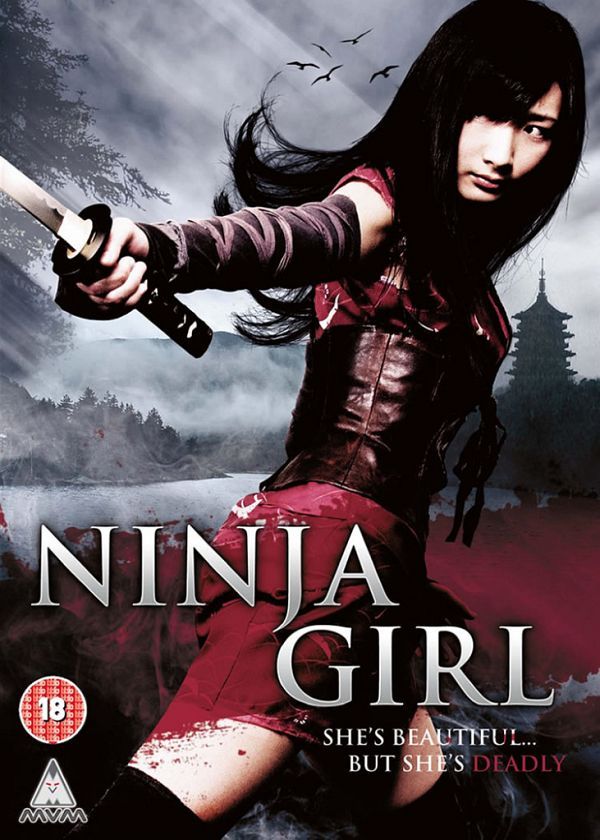 From the director of Alien vs. Ninja, the story here centres on a pair of ninjas, Shimotsuki and Hyotsuki, who are carrying on what appears to be a family tradition, kidnapping women from other clans’ villages, and taking them back to their own for nefarious purposes – let’s just say, the phrase “tools of pleasure” crops up on more than one occasion. They ar returning with their latest batch of four, including Kisaragi (Takeda), who is a ninja in her own right. With the help of a mysterious man (Sato), Kisuragi and her colleagues in imprisonment are released from their bondage – but that is only the first obstacle between them and their freedom. Of course, it turns out the heroine is not quite as innocent as she appears, and has an agenda of her own, because her mother was kidnapped by the same sleazy ninjas, when Kisuragi was just a baby.
From the director of Alien vs. Ninja, the story here centres on a pair of ninjas, Shimotsuki and Hyotsuki, who are carrying on what appears to be a family tradition, kidnapping women from other clans’ villages, and taking them back to their own for nefarious purposes – let’s just say, the phrase “tools of pleasure” crops up on more than one occasion. They ar returning with their latest batch of four, including Kisaragi (Takeda), who is a ninja in her own right. With the help of a mysterious man (Sato), Kisuragi and her colleagues in imprisonment are released from their bondage – but that is only the first obstacle between them and their freedom. Of course, it turns out the heroine is not quite as innocent as she appears, and has an agenda of her own, because her mother was kidnapped by the same sleazy ninjas, when Kisuragi was just a baby.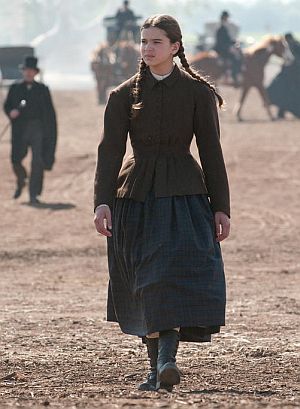 Based on the original source material – which was very much focused on John Wayne – and the trailers, you’d be forgiven for thinking of this as just another macho Western. However, I read some pieces which suggested that wasn’t the case, with the story [as in the original novel] told from the viewpoint of teenage girl Mattie Ross (Steinfeld), who hires drunken Marshal Rooster Cogburn (Bridges) to hunt down the outlaw (Brolin), who killed her father. That is indeed the case – despite Steinfeld getting an Oscar nomination for Best Supporting Actress, while Bridges was listed for Best Actor. Go figure.
Based on the original source material – which was very much focused on John Wayne – and the trailers, you’d be forgiven for thinking of this as just another macho Western. However, I read some pieces which suggested that wasn’t the case, with the story [as in the original novel] told from the viewpoint of teenage girl Mattie Ross (Steinfeld), who hires drunken Marshal Rooster Cogburn (Bridges) to hunt down the outlaw (Brolin), who killed her father. That is indeed the case – despite Steinfeld getting an Oscar nomination for Best Supporting Actress, while Bridges was listed for Best Actor. Go figure.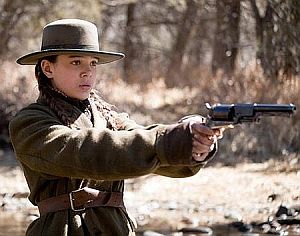 That said, there’s something refreshing about the way this is…well,
That said, there’s something refreshing about the way this is…well,  “What did your mother die of?”
“What did your mother die of?” ★★★★½
★★★★½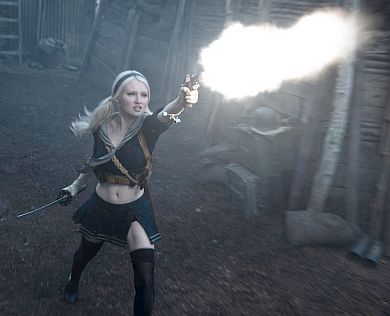 There’s not even any genre love lost. Joe Wright, director of the somewhat similarly-themed Hanna, which came out two weeks after Sucker,
There’s not even any genre love lost. Joe Wright, director of the somewhat similarly-themed Hanna, which came out two weeks after Sucker, 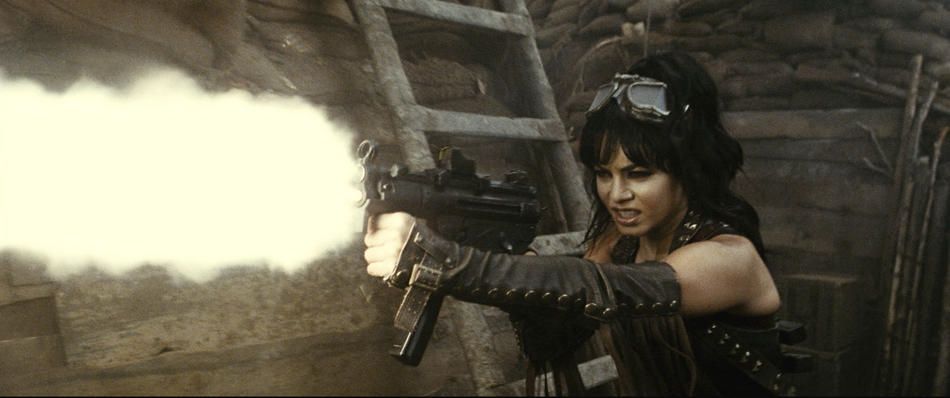 But those who like it,
But those who like it, 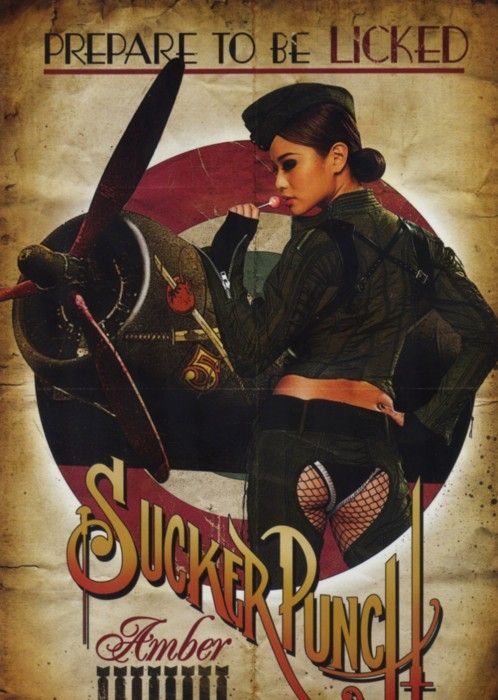
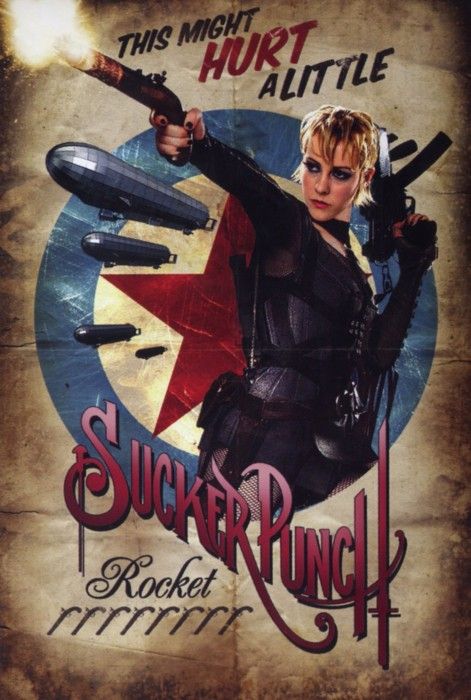
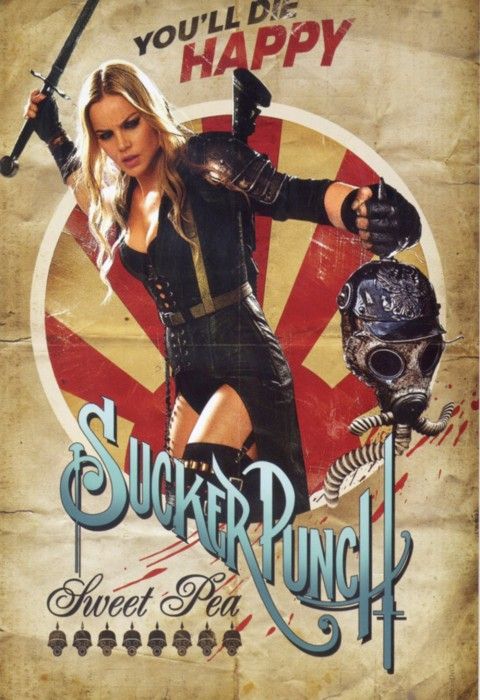
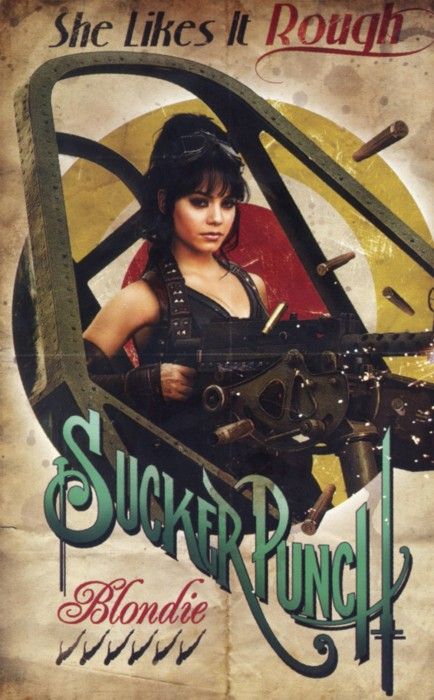
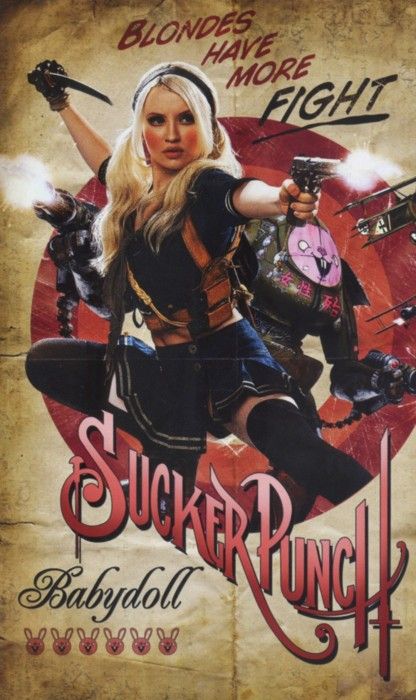
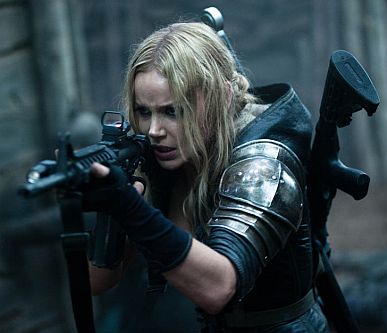 The movie itself is imperfect; by some measures perhaps not even the “best” GWG film I’ve seen at the cinema this month. However, it is thoroughly cinematic and can only be admired as such – I’m far more likely to pick up the Blu-Ray DVD of this than Hanna. An un-named 20-year old (Browning) is sent to a lunatic asylum by her stepfather, after rejecting his attentions and being made the scapegoat for the death of her younger sister; her lobotomy is scheduled for five days time. Turns out the asylum is a high-end brothel where our heroine – nick-named “Baby Doll” – and the other girls are kept to perform for the pleasure of various high-rollers. Baby Doll plots an escape, the tools necessary lifted by her accomplices while she entrances the staff and customers with her dancing. During these, Baby Doll retreats even further, to fantasy worlds to do battle against dragons, robots, samurai warriors, etc. But which “reality” is real?
The movie itself is imperfect; by some measures perhaps not even the “best” GWG film I’ve seen at the cinema this month. However, it is thoroughly cinematic and can only be admired as such – I’m far more likely to pick up the Blu-Ray DVD of this than Hanna. An un-named 20-year old (Browning) is sent to a lunatic asylum by her stepfather, after rejecting his attentions and being made the scapegoat for the death of her younger sister; her lobotomy is scheduled for five days time. Turns out the asylum is a high-end brothel where our heroine – nick-named “Baby Doll” – and the other girls are kept to perform for the pleasure of various high-rollers. Baby Doll plots an escape, the tools necessary lifted by her accomplices while she entrances the staff and customers with her dancing. During these, Baby Doll retreats even further, to fantasy worlds to do battle against dragons, robots, samurai warriors, etc. But which “reality” is real?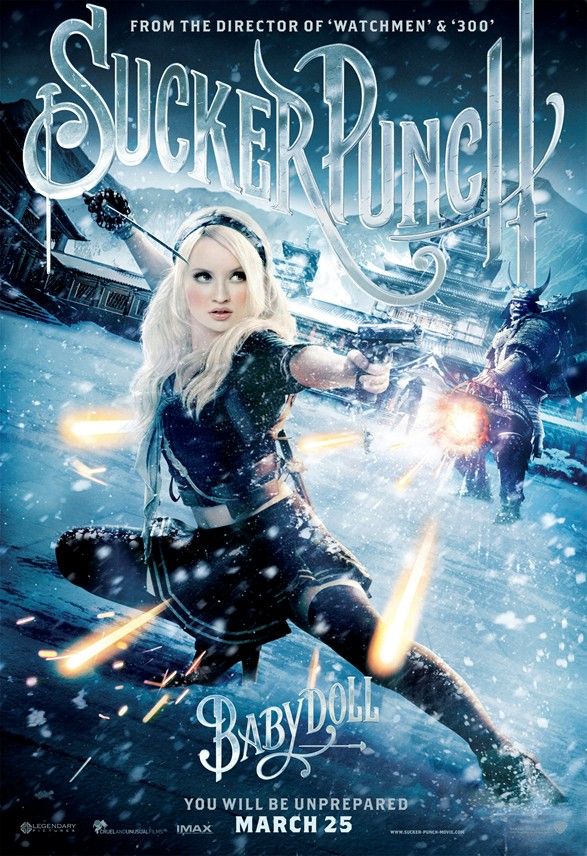 Since Baby Doll is explicitly stated to be 20, this doesn’t strictly fall into the category of “teenage action heroines,” but her hair, clothes, make-up, etc. all are designed to evoke the spirit of what Chris disparagingly called, “schoolgirl porn” – but the PG-13 rating means it can get absolutely no closer, so really, what’s the point? At least Showgirls delivered the goods: Baby Doll’s fantasy world might as well have been an office, college dorm or, frankly, convent, instead of the world’s most demure brothel.
Since Baby Doll is explicitly stated to be 20, this doesn’t strictly fall into the category of “teenage action heroines,” but her hair, clothes, make-up, etc. all are designed to evoke the spirit of what Chris disparagingly called, “schoolgirl porn” – but the PG-13 rating means it can get absolutely no closer, so really, what’s the point? At least Showgirls delivered the goods: Baby Doll’s fantasy world might as well have been an office, college dorm or, frankly, convent, instead of the world’s most demure brothel. 




























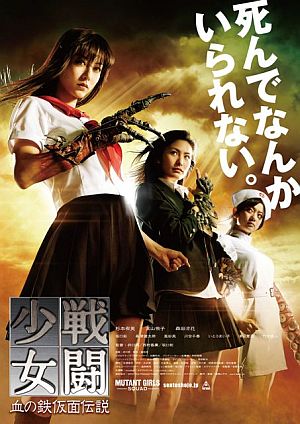 It makes sense that this stems from a drunken agreement between the three co-directors at a film festival, because this is the sort of film you would only make under inebriated terms, and it’s probably true to say that drunk is the best way to watch this. That’s not a bad thing per se, just that its loopy sensibilities and over-the-top antics would seem to go
It makes sense that this stems from a drunken agreement between the three co-directors at a film festival, because this is the sort of film you would only make under inebriated terms, and it’s probably true to say that drunk is the best way to watch this. That’s not a bad thing per se, just that its loopy sensibilities and over-the-top antics would seem to go 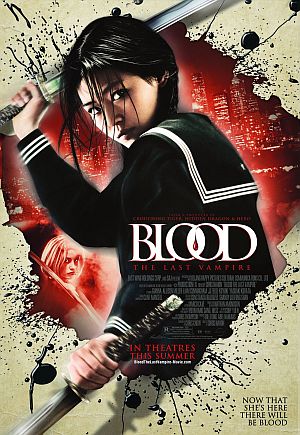 The animated version was one of the first reviews I wrote for the site, and I didn’t like it much – the fifty-minute running time allowed for hardly any development of scenario or characters at all. The feature fares a good bit better in these departments, though suffers from some horrendous editing styles and a couple of monsters which appear to have strayed in from a Playstation game (and I am not talking Playstation 3 here, either). The basic plot is retained. Saya (Gianna) is a half-demon with a grudge, intent on taking out Onigen (Koyuki), the one responsible for the death of her father. Working under the loose guidance of The Council, she is inserted into a school on an American air-force base in 1970 Japan. American girl Alice (Miller) has been added; Saya rescues her, and the two end up on the run, pursued both by Onigen and more regular forces.
The animated version was one of the first reviews I wrote for the site, and I didn’t like it much – the fifty-minute running time allowed for hardly any development of scenario or characters at all. The feature fares a good bit better in these departments, though suffers from some horrendous editing styles and a couple of monsters which appear to have strayed in from a Playstation game (and I am not talking Playstation 3 here, either). The basic plot is retained. Saya (Gianna) is a half-demon with a grudge, intent on taking out Onigen (Koyuki), the one responsible for the death of her father. Working under the loose guidance of The Council, she is inserted into a school on an American air-force base in 1970 Japan. American girl Alice (Miller) has been added; Saya rescues her, and the two end up on the run, pursued both by Onigen and more regular forces.